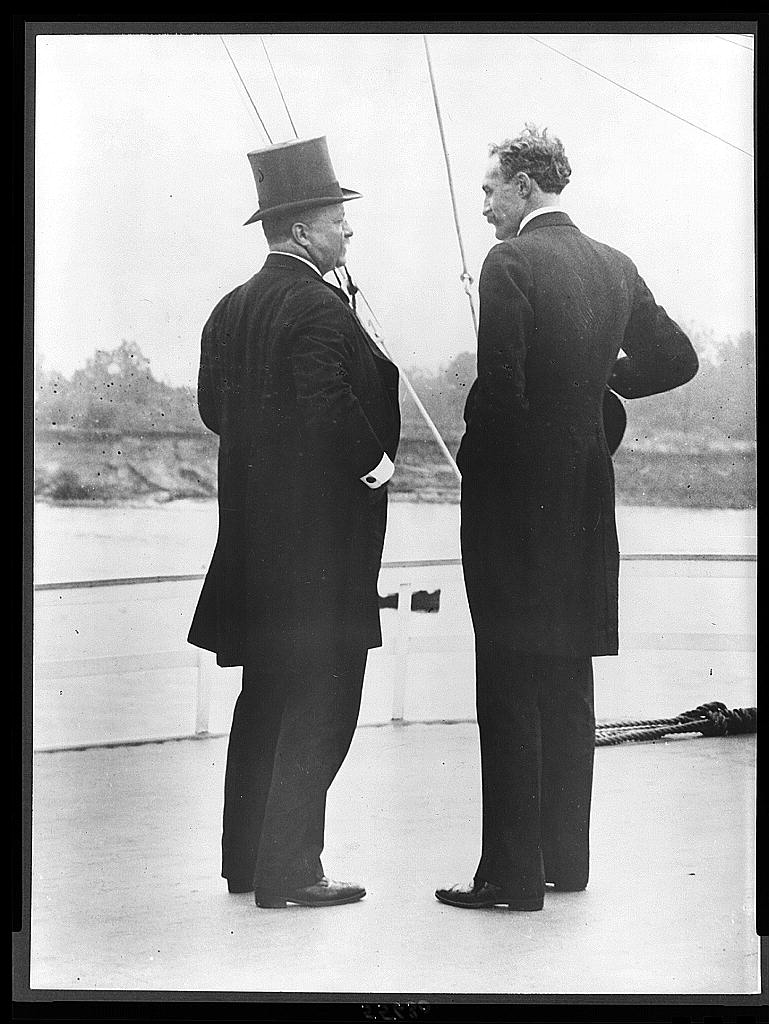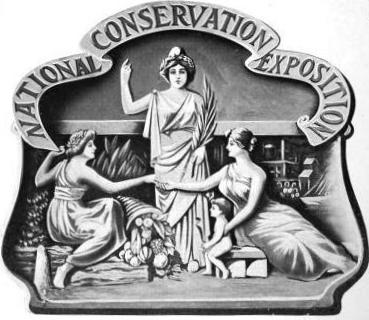|
National Conservation Congress
The National Conservation Commission was appointed on June 8, 1908 by President Theodore Roosevelt and consisted of representatives of the United States Congress and relevant executive agency technocrats; Gifford Pinchot served as chairman of its executive committee. The commission was the fourth of seven conservation commissions and conferences established during Roosevelt's presidency (1901-1909). This commission had resulted from the first Conference of Governors just weeks earlier, which similarly had stemmed from the previous recommendations of the Inland Waterways Commission, presented to Congress in February 1908. The National Conservation Commission was divided into four sections, water, forests, lands, and minerals, with each having its own chairman; it prepared the first inventory of the nation's natural resources, in a three-volume report submitted to Congress at the beginning of 1909. The commissions findings also present Pinchot's concepts of resource management as a com ... [...More Info...] [...Related Items...] OR: [Wikipedia] [Google] [Baidu] |
Theodore Roosevelt
Theodore Roosevelt Jr. ( ; October 27, 1858 – January 6, 1919), often referred to as Teddy or by his initials, T. R., was an American politician, statesman, soldier, conservationist, naturalist, historian, and writer who served as the 26th president of the United States from 1901 to 1909. He previously served as the 25th vice president of the United States, vice president under President William McKinley from March to September 1901 and as the 33rd governor of New York from 1899 to 1900. Assuming the presidency after Assassination of William McKinley, McKinley's assassination, Roosevelt emerged as a leader of the History of the Republican Party (United States), Republican Party and became a driving force for United States antitrust law, anti-trust and Progressive Era, Progressive policies. A sickly child with debilitating asthma, he overcame his health problems as he grew by embracing The Strenuous Life, a strenuous lifestyle. Roosevelt integrated his exuberant personalit ... [...More Info...] [...Related Items...] OR: [Wikipedia] [Google] [Baidu] |
United States Congress
The United States Congress is the legislature of the federal government of the United States. It is bicameral, composed of a lower body, the House of Representatives, and an upper body, the Senate. It meets in the U.S. Capitol in Washington, D.C. Senators and representatives are chosen through direct election, though vacancies in the Senate may be filled by a governor's appointment. Congress has 535 voting members: 100 senators and 435 representatives. The U.S. vice president has a vote in the Senate only when senators are evenly divided. The House of Representatives has six non-voting members. The sitting of a Congress is for a two-year term, at present, beginning every other January. Elections are held every even-numbered year on Election Day. The members of the House of Representatives are elected for the two-year term of a Congress. The Reapportionment Act of 1929 establishes that there be 435 representatives and the Uniform Congressional Redistricting Act requires ... [...More Info...] [...Related Items...] OR: [Wikipedia] [Google] [Baidu] |
Gifford Pinchot
Gifford Pinchot (August 11, 1865October 4, 1946) was an American forester and politician. He served as the fourth chief of the U.S. Division of Forestry, as the first head of the United States Forest Service, and as the 28th governor of Pennsylvania. He was a member of the Republican Party for most of his life, though he joined the Progressive Party for a brief period. Born into the wealthy Pinchot family, Gifford Pinchot embarked on a career in forestry after graduating from Yale University in 1889. President William McKinley appointed Pinchot as the head of the Division of Forestry in 1898, and Pinchot became the first chief of the U.S. Forest Service after it was established in 1905. Pinchot enjoyed a close relationship with President Theodore Roosevelt, who shared Pinchot's views regarding the importance of conservation. After William Howard Taft succeeded Roosevelt as president, Pinchot was at the center of the Pinchot–Ballinger controversy, a dispute with Secretary of ... [...More Info...] [...Related Items...] OR: [Wikipedia] [Google] [Baidu] |
Conference Of Governors
The Conference of Governors was held in the White House May 13–15, 1908 under the sponsorship of President Theodore Roosevelt. Gifford Pinchot, at that time Chief Forester of the U.S., was the primary mover of the conference, and a progressive conservationist, who strongly believed in the scientific and efficient management of natural resources on the federal level. He was also a prime mover of the previous Inland Waterways Commission, which recommended such a meeting the previous October. On November 13, 1907, the President issued invitations to the governors of the States and Territories to meet at the White House on those dates. This 1908 meeting was the beginning of the annual governors' conferences, now held by the National Governors Association. The focus of the conference was on natural resources and their proper use. President Roosevelt delivered the opening address: "Conservation as a National Duty." Among those speaking were leading industrialists, such as Andrew Carn ... [...More Info...] [...Related Items...] OR: [Wikipedia] [Google] [Baidu] |
Inland Waterways Commission
The Inland Waterways Commission was created by Congress in March 1907, at the request of President Theodore Roosevelt, to investigate the transportation crisis that recently had affected nation's ability to move its produce and industrial production efficiently. The immediate crisis centered on insufficient railroad capacity developed by the private sector, and competing but neglected inland shipping, the navigation of which had been deemed under federal purview since 1824. The temporary commission lasted until the end of Roosevelt's presidency, but his conservationist progressive interest was focused more than on transportation alone. The president wanted water projects to be considered for their multiple uses and in relation to other natural resources and asked for a comprehensive plan for the improvement and control of the river systems of the United States. Based on long-established legislative structure and more recent bureaucratic additions, the appointed members of the com ... [...More Info...] [...Related Items...] OR: [Wikipedia] [Google] [Baidu] |
Dominion Of Newfoundland
Newfoundland was a British dominion in eastern North America, today the modern Canadian province of Newfoundland and Labrador. It was established on 26 September 1907, and confirmed by the Balfour Declaration of 1926 and the Statute of Westminster of 1931. It included the island of Newfoundland, and Labrador on the continental mainland. Newfoundland was one of the original dominions within the meaning of the Balfour Declaration and accordingly enjoyed a constitutional status equivalent to the other dominions of the time. In 1934, Newfoundland became the only dominion to give up its self-governing status, which ended 79 years of self-government. The abolition of self-government came about because of a crisis in Newfoundland's public finances in 1932. Newfoundland had accumulated a significant amount of debt by building a railway across the island, which was completed in the 1890s, and by raising its own regiment during World War I. In November 1932, the government warned th ... [...More Info...] [...Related Items...] OR: [Wikipedia] [Google] [Baidu] |
National Conservation Exposition
The National Conservation Exposition was an exposition held in Knoxville, Tennessee, United States, between September 1, 1913 and November 1, 1913. The exposition celebrated the cause of bringing national attention to conservation activities, especially in the Southeastern United States. The fair was held in what is now Knoxville's Chilhowee Park in East Knoxville. History Inspired by the successes of Knoxville's Appalachian Expositions of 1910 and 1911, civic leaders sought to bring greater national exposure to the community with a third exhibition in 1913. At its 1912 convention, the National Conservation Congress endorsed Knoxville as the conservation fair site, and the National Conservation Exposition Company was established. The Tennessee state legislature appropriated $25,000 for the Exposition with the passage of the Senate Bill #1, Chapter 19 of the general appropriation bill during the 58th General Assembly, but the state comptroller opposed the funding on the grounds ... [...More Info...] [...Related Items...] OR: [Wikipedia] [Google] [Baidu] |
United States National Commissions
United may refer to: Places * United, Pennsylvania, an unincorporated community * United, West Virginia, an unincorporated community Arts and entertainment Films * ''United'' (2003 film), a Norwegian film * ''United'' (2011 film), a BBC Two film Literature * ''United!'' (novel), a 1973 children's novel by Michael Hardcastle Music * United (band), Japanese thrash metal band formed in 1981 Albums * ''United'' (Commodores album), 1986 * ''United'' (Dream Evil album), 2006 * ''United'' (Marvin Gaye and Tammi Terrell album), 1967 * ''United'' (Marian Gold album), 1996 * ''United'' (Phoenix album), 2000 * ''United'' (Woody Shaw album), 1981 Songs * "United" (Judas Priest song), 1980 * "United" (Prince Ital Joe and Marky Mark song), 1994 * "United" (Robbie Williams song), 2000 * "United", a song by Danish duo Nik & Jay featuring Lisa Rowe Television * ''United'' (TV series), a 1990 BBC Two documentary series * ''United!'', a soap opera that aired on BBC One from 1965-19 ... [...More Info...] [...Related Items...] OR: [Wikipedia] [Google] [Baidu] |
Nature Conservation Organizations Based In The United States
Nature, in the broadest sense, is the physical world or universe. "Nature" can refer to the phenomena of the physical world, and also to life in general. The study of nature is a large, if not the only, part of science. Although humans are part of nature, human activity is often understood as a separate category from other natural phenomena. The word ''nature'' is borrowed from the Old French ''nature'' and is derived from the Latin word ''natura'', or "essential qualities, innate disposition", and in ancient times, literally meant "birth". In ancient philosophy, ''natura'' is mostly used as the Latin translation of the Greek word ''physis'' (φύσις), which originally related to the intrinsic characteristics of plants, animals, and other features of the world to develop of their own accord. The concept of nature as a whole, the physical universe, is one of several expansions of the original notion; it began with certain core applications of the word φύσις by pre-Socr ... [...More Info...] [...Related Items...] OR: [Wikipedia] [Google] [Baidu] |
Progressive Era In The United States
Progressive may refer to: Politics * Progressivism, a political philosophy in support of social reform ** Progressivism in the United States, the political philosophy in the American context * Progressive realism, an American foreign policy paradigm focused on producing measurable results in pursuit of widely supported goals Political organizations * Congressional Progressive Caucus, members within the Democratic Party in the United States Congress dedicated to the advancement of progressive issues and positions * Progressive Alliance (other) * Progressive Conservative (other) * Progressive Party (other) * Progressive Unionist (other) Other uses in politics * Progressive Era, a period of reform in the United States (c. 1890–1930) * Progressive tax, a type of tax rate structure Arts, entertainment, and media Music * Progressive music, a type of music that expands stylistic boundaries outwards * "Progressive" (song), a 2009 single b ... [...More Info...] [...Related Items...] OR: [Wikipedia] [Google] [Baidu] |





.jpg)